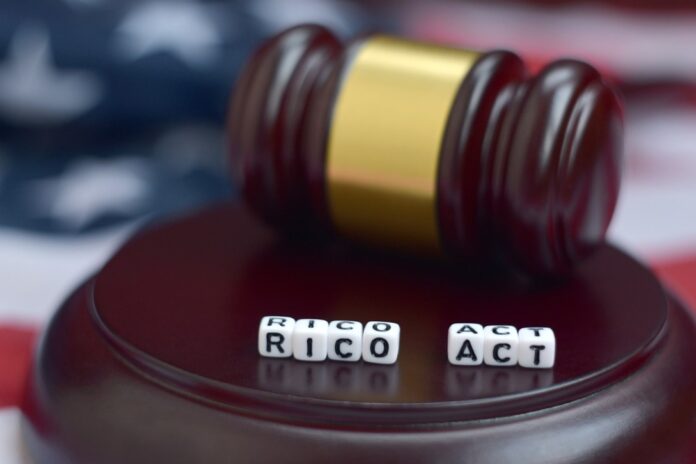Trump’s central legislation indicts police training centers to prosecute mafia bosses
Last month, former President Donald Trump and 18 co-defendants faced indictment in Fulton County on charges of racketeering and additional state offenses. Recently, Georgia’s attorney general utilized the same state racketeering law to indict 61 activists protesting against Atlanta’s proposed public safety training center in DeKalb County. Understanding Georgia’s version of the Racketeer Influenced and Corrupt Organizations Act (RICO) is crucial to comprehending the legal landscape.
Enacted in 1981, Georgia’s RICO law mirrors the federal statute aimed at prosecuting Mafia leaders. To establish a case, prosecutors must demonstrate a pattern of racketeering activity involving two or more individuals seeking to control or protect interests in an enterprise. This enterprise could range from a criminal organization to a political campaign or institution, as asserted in Trump’s case.
The indictment alleges Trump and others formed a “criminal organization” to overturn Georgia’s 2020 election results, listing over 40 predicate acts, including false statements, forgery, and perjury. A RICO conviction carries a sentence of five to 20 years, a fine up to $25,000, or three times the value gained through racketeering.
Georgia’s RICO law, more expansive than the federal version, permits the introduction of evidence that might not stand alone as individual crimes. Critics argue it has been overused and can complicate cases, potentially backfiring prosecutors. Notably, RICO has been successfully applied in Georgia against street gangs, an assisted suicide network, and public school teachers involved in the Atlanta cheating scandal.
Fani Willis, the DA overseeing the Trump case, previously utilized RICO to secure convictions in the Atlanta Public Schools scandal. She currently pursues cases against alleged street gangs and burglary rings, showcasing the diverse applications of this controversial but potent legal tool.
The recent deployment of Georgia’s Racketeer Influenced and Corrupt Organizations Act (RICO) in the indictment of Former President Donald Trump and subsequent use against activists protesting a public safety training center underscores the far-reaching implications of this legal tool. Established in 1981, Georgia’s RICO law closely aligns with its federal counterpart, originally designed to dismantle organized crime, especially the Mafia. However, its application has evolved, revealing both its potency and controversy.
The indictment against Trump and his co-defendants asserts the formation of a “criminal organization” to overturn Georgia’s 2020 election results. The expansive list of over 40 predicate acts, including false statements, forgery, and computer-related crimes, illustrates the broad spectrum of offenses that fall under RICO’s purview. A conviction under this statute carries a substantial penalty of five to 20 years, fines, or a combination of both.
Georgia’s RICO law, notably more extensive than its federal counterpart, allows prosecutors to introduce evidence that might not independently constitute crimes. This flexibility, however, has been met with criticism, with detractors arguing that it has been overused and can potentially complicate cases for jurors. Moreover, the law permits the inclusion of crimes committed outside Georgia, enabling prosecutors to establish a broader conspiracy, as seen in the Trump case.
Historically, Georgia has successfully employed RICO against various targets, including street gangs, an assisted suicide network, and individuals involved in the Atlanta Public Schools cheating scandal. Its application has proven versatile, enabling prosecutors to address complex criminal enterprises that may not be adequately addressed by traditional legal avenues.
As Fani Willis, the DA overseeing the Trump case navigates this legal terrain, the controversy surrounding RICO’s usage continues. Its multifaceted applications, from political cases to organized crime, highlight the adaptability and potential risks associated with this legal framework. The unfolding legal proceedings will likely contribute to the ongoing discourse on the appropriate and effective use of RICO in addressing complex criminal activities in the state of Georgia.
- Pet Friendly Ice Melt for Snow: Our pet friendly ice melt for snow is designed to quickly and efficiently melt snow and ice, while being safe for pets to walk on. It's the perfect choice for keeping your pathways clear and safe for everyone in your family, including your pets.
- Quality is Key: Our snow and ice melt won't sacrifice the quality of standard rock salt for snow and other winter salt products. Paw Protector dog safe salt melt melts snow and ice at temperatures as low as -22 degrees fahrenheit.
- Keep Your Driveway Clean and Clear: Our ice melt for concrete leaves NO visible residue, unlike other pet safe ice melter products. Avoid excessive stains to concrete to maintain a cleaner appearance!
- Concrete Safe Ice Melt: Melt snow with a product that is far less corrosive than rock salt and calcium chloride ice melt. Keep your concrete safer from cracks and other winter stresses.
- Think of your Neighbors: When choosing an ice melt for snow always remember to use a pet friendly product to keep everyone in the neighborhood safe, whether they have four legs or two!
- Pet Friendly Ice Melt: Our product is designed with your pets' safety in mind. This ice melt is pet friendly, ensuring that it won't harm your furry friends when they come into contact with it during their outdoor adventures.









